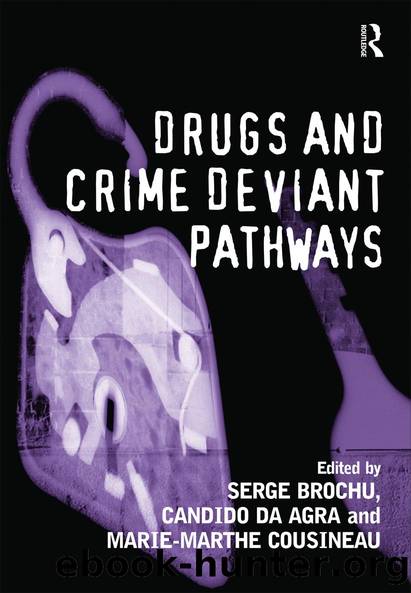Drugs and Crime Deviant Pathways by Candido Da Agra Serge Brochu

Author:Candido Da Agra, Serge Brochu [Candido Da Agra, Serge Brochu]
Language: eng
Format: epub
ISBN: 9781351942737
Barnesnoble:
Publisher: Taylor & Francis
Published: 2017-05-15T00:00:00+00:00
Regression of deviant lifestyles
The deviant lifestyle trajectories of the young people we encountered are scattered with periods when involvement in delinquency or drug use temporarily or âpermanentlyâ declined. Qualitative studies which treat the decline of deviant lifestyles more or less directly tend to be more specifically concerned with social rehabilitation of homeless or drug-addicted adults (Castel et al., 1992; Racine and Mercier, 1995), and young delinquents and drug addicts are underrepresented in them.
Furthermore, most studies (quantitative and qualitative) which examine the decline of deviant lifestyles are concerned with the more general reduction in delinquency that comes with age, particularly at the end of adolescence and after the age of 30 (Gauss curve) (Hirshi and Gottfredson, 1983; Le Blanc, 1994a). Their focus is on a more long-term regression (decrease), generally observable in adulthood. For our part, we are as interested in the temporary periods of regression in deviant lifestyles on young respondentsâ trajectories as in the more durable ones.
The inventoried reasons linked to this decrease in involvement in delinquency or drug use are many and varied depending on the individual, whether it be a question of maturation, values, employment, life events or something else. (Ouimet and Le Blanc, 1993; Sampson and Laub, 1993; Brochu, 1995; Grapendaal et al, 1995; Kelley et al, 1997; Vaughn and Long, 1999). Here, we will examine the young peopleâs point of view with regard to the reasons which led them to decrease their involvement in deviant behaviour at certain times.
Download
This site does not store any files on its server. We only index and link to content provided by other sites. Please contact the content providers to delete copyright contents if any and email us, we'll remove relevant links or contents immediately.
Chaco's Northern Prodigies : Salmon, Aztec, and the Ascendancy of the Middle San Juan Region after AD 1100 by Paul F. Reed(379)
Digital International Relations by Unknown(375)
Law Enforcement Interpersonal Communication and Conflict Management by Brian Douglas Fitch(365)
Skilled interpersonal communication: Research, theory and practice, Fifth edition by Owen Hargie(355)
The Enduring Color Line in U.S. Athletics by Krystal Beamon Chris M. Messer(353)
Critical Perspectives on Human Security : Rethinking Emancipation and Power in International Relations by David Chandler; Nik Hynek(341)
EPSO CAST Political affairs EU policies: How to succeed in the selection procedure by Franco Reverte José María(328)
Evidence-Based Policy Making in Labor Economics by Hamermesh Daniel S.;Nottmeyer Olga K.;Nottmeyer Olga;King Sarah;King Sarah;King Sarah;(319)
Writing Public Policy - A Practical Guide to Communicating in the Policy Making Process by Catherine F. Smith(297)
Criminological Theory in Context by John Martyn Chamberlain(294)
Rothschild and Early Jewish Colonization in Palestine (Geographical Perspectives on the Human Past) by Ran Aaronsohn(292)
Positive Psychology and Spirituality in Counselling and Psychotherapy (Conflict, Ethics, and Spirituality, 12) by unknow(289)
Tibeton Yoga Its Secret Doc by Evans-Wentz(283)
Threshold Concepts in Women's and Gender Studies by Christie Launius Holly Hassel(279)
Social Problems, Social Issues, Social Science by James Wright(278)
Cognitive Development in Infancy and Childhood (Elements in Child Development) by Mary Gauvain(273)
Play in child development and psychotherapy: toward empirically supported practice by Sandra W. Russ(272)
Latin American Politics and Society by Gerardo L. Munck & Juan Pablo Luna(252)
The Arab Spring Abroad: Diaspora Activism against Authoritarian Regimes by Dana M. Moss(234)
